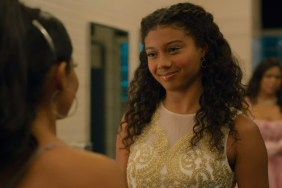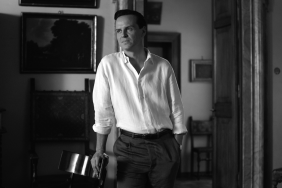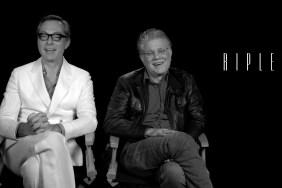Netflix‘s new original series Stranger Things is literally a gift to anyone who grew up loving sci-fi/horror in the 1980s, be it the suburban supernaturalism of Steven Spielberg (E.T., Poltergeist, Close Encounters of the Third Kind), the minimalist paranoia of John Carpenter (Halloween, The Thing, Starman), or the small-town characters who populated Stephen King‘s work (“Salem’s Lot,” “Carrie,” “It”).
The story starts with a monstrous creature escaping from a shadowy government lab, and gets set in motion when a young girl with psychic powers mysteriously appears around the same time a young boy mysteriously disappears. A frantic mother (Winona Ryder) and a trio of his young friends search for the boy while an amoral scientist (Matthew Modine) searches for the girl, and everyone attempts to gain access to and understand the alternate dimension the monster comes from.
Stranger Things, whose eight-episode first season is now available in its entirety on Netflix streaming, was created by filmmakers Matt Duffer and Ross Duffer and shepherded to the small screen by blockbuster filmmaker Shawn Levy (the Night at the Museum trilogy, Real Steel), who also directed the third and fourth episodes. We talked to Levy in an exclusive 1-on-1 about the show, how he changed his style to match what the Duffers did in their episodes (and vice versa), as well as the inevitable comparisons to J.J. Abrams’ Super 8 and what’s in store for Season 2!
RELATED: Shawn Levy Talks Casting for Starman Remake
ComingSoon.net: The decision for you to direct two episodes right in the middle, was that to give the Duffer Brothers a reprieve?
Shawn Levy: Yeah, it was that two-pronged kind of rationale. The first is that I definitely needed to buy the brothers the time to write and rewrite the second half of the season. So that was one reason why it fell in the middle, but the truth is that selfishly I knew the script for episodes three and four, and they had some of the coolest kind of visuals and emotional themes and I couldn’t wait to get my hands on them.
CS: You did a great job matching the style and performance tempo the Bros. had set up. Was that a challenge for you?
Levy: Well, yeah. I mean, it wasn’t a challenge in the sense that I only produce things when I am a true believer in the filmmaker, and I really am, in regards to the Duffers. So I wanted to be loyal to their aesthetic and their characters, but it was interesting because you may have noticed, I move the camera a lot more in episodes three and four than they did in one to two. And as they were watching my dailies, they were like, “Well, we like that better, so we’re going to change the visual rules,” and they ended up matching what I did, which resulted in a lot more camera movement throughout the back half of the season.
CS: Did you bring any expertise having actually appeared in a handful of ’80s horror movies?
Levy: That’s a little known fact, but thank you for combing the internet. I was one of the stars of the barely seen ’80s horror classic “Zombie Nightmare,” in which, as I recall it, I play a bad boy with big hair, who ends up being impaled on a softball bat by a zombie. So I brought tremendous depth of knowledge from the horror genre to “Stranger Things” in the new millennium.

CS: Was it fun doing your little cameo as the coroner with Winona in Episode 4?
Levy: I actually have gotten to a point where I hate myself on screen, which is why I did it as a goof, and then I cut myself almost entirely out of the show because I didn’t want to look at myself.
CS: Right. You were hidden behind a surgical mask for most of it.
Levy: That’s right, but I was doing all kinds of creepy sh*t under that surgical mask.
CS: I bet it was Laurence Olivier level.
Levy: Yeah, but I mean, the other thing I brought to it—I mean, I worked with Steven Spielberg on a movie. He produced “Real Steel,” and this show is a love letter to so much of his iconography and work. It was meaningful in a unique way to me, and also trying to be very much the kind of producer that Steven had been for me.
CS: It’s interesting you brought that up, because I’d like to talk a little about the pop culture influences on the show. First off, the inevitable comparison, which was to “Super 8.” To me, having seen it, the show is very distinct from that movie but cosmetically a lot of people might draw a comparison. How do you think it’s distinct from J.J.’s movie?
Levy: First of all, I just absolutely did love “Super 8.” And it’s interesting because I was conscious of “Lost,” while we were making “Stranger Things,” which the Duffers never saw. But I knew there would be some J.J. comparisons, just as there would be some Spielberg comparisons. “Super 8” is a great movie, but because we are essentially an eight-hour movie, we got to do a deeper dive across a broader range of characters and into the characters that we focused on. Like there’s only so much you can do in a two-hour feature, which is why so many of us are doing such gratifying work in television right now. So I feel like cosmetically, there will be those links to “Super 8,” but in the same way that “Super 8” was both an alien movie and a coming-of-age middle school movie, I feel like “Stranger Things” is so much more than the trappings of ’80s nostalgia which is only a small part of what makes the show great. I think it’s the characters that make the show great, and those are entirely unique from anything Steven and J.J. has done.
CS: This is my opinion, but I think that “Super 8” had wonderful things in it, but there were also some emotionally inexplicable things where it went for sentiment in places that didn’t necessarily feel appropriate. This show manages to feel heartfelt while straying into much more emotionally swampy territory.
Levy: I think that’s very well put. And I also think that J.J., frankly, like me as a filmmaker, he definitely loves sentiment. He definitely loves to indulge in sentiment. The Duffers resist sentimental moments, but they welcome poignant ones. They tread very lightly on sentiment in their determination to avoid sentimentality. Also, honestly, because we have eight hours, we don’t need to go for the jugular in any given moment. Drama series deal in accrual of emotion, whereas movies need to land punches when they throw them.

CS: For example, the Millennium Falcon scene, which you directed, if other people had directed that scene, we would have seen the Falcon toy launching slowly off the floor, the music swelling, the kids looking at it in awe. Instead, it’s just something that Eleven kinda does and then stops doing just as casually. It’s drained of all sentiment.
Levy: Yeah, I’m extra proud of that because we initially got turned down to use any “Star Wars” paraphernalia because we made this show in the middle of “The Force Awakens,” so they would be very judicious about big agreements. Thankfully, I know a bunch of people involved in the making of those movies so I was able to do my producer job and get stuff done, and the payoff is huge. The Falcon is so what every kid had in 1983, but it’s a boredom activity for Eleven and I didn’t want to make more of it than it would be for that character.
CS: This might be going out on a limb, but I found David Harbour’s police chief to be sort of a hybrid between Roy Scheider in “Jaws” and James Brolin in “The Car.” Were either of those discussed?
Levy: Yes, we talked about Scheider, but other than the literal movie posters on the walls in the rooms of the show, the Duffers really weren’t looking at direct antecedents or references. They are straight up, “Don’t need this.” And the show is being talked as a nostalgia piece for the ’80s, like, but what it actually is is a nostalgia piece for the movies of the ’80s. And these brothers grew up in North Carolina obsessed with cinema and with this period of cinema—Spielberg, King, Carpenter. And so, their fandom is authentic, and it is in every cell in their bodies. I think that, yes, there’s no question there’s a certain Spielberg archetype in some of these kids and the Hopper character, but we didn’t talk about literal touchstones that often. It was just so clearly in the room in every step of making the show, that love of the archetype.
CS: Can you get a little bit more in depth about what the process was with you and the other producers of laying the piping and story architecture?
Levy: I don’t know how much detail you want, but the first thing I think that’s very, very unusual about this show, which…. you talk about the other producers, what is remarkable about this show is there are none. This show was a tiny creative team, and it highlighted how extraneous so much of the committee work that usually goes into TV is. It was the Duffer brothers, with me and Dan Cohen, the executive producers, and it was our Netflix executives, of which there were two or three who were involved. So it was, by television standards, a bare bones creative unit, which is why the show feels very consistent in its voice and in its vision. The Duffers came up with the idea. We got involved early. Netflix was our first choice. We pitched them first. They bought it, and from then on, literally in our very first meeting after the sale, we made it clear that we were going to have a very full writer’s room, that the Duffers were going to lay hands on every script. Regardless of who got credit, the Duffers had a major hand in every script, and every episode was going to be directed by the Duffers or me. There would be no outsider directors, and to their credit Netflix just said yes to everything. They trusted us. The Duffers would come up with the ideas for the episodes, run them by Dan and me. We would modify them. Then, we would pitch the network, who would weigh in with them and that’s exactly what got written. Everyone asks me, “Are there deleted scenes?” There aren’t. That is insane. These scripts were so well crafted by the Duffers that every episode is basically completely true to the teleplay, which, if you could imagine, rarely happens.
CS: Yeah, that’s pretty astonishing. I love a lot of the actors in the show, specifically I like a lot of the unknowns, because they’re all very unique. They don’t look like TV kids. They look like real kids.
Levy: Because you mentioned it, the Duffers are interesting because they’re very humble and they really took my thought-fathering welcomingly. But, they also can be super f*cking stubborn with what they want and they wanted kid actors who do not look like anything on TV. They rejected hundreds of kid actors who may have been really talented, but didn’t feel authentic and real, and the search continued. And so, that credit really goes to the Duffers, who were vigilant in wanting naturalism.

CS: Right. I know recently Matthew Modine popped up in “Dark Knight Rises,” and Winona Ryder popped up in “Star Trek,” and even though they’re both steadily working actors, I would say they’re terribly underutilized by the mainstream industry. What prompted those two casting choices specifically? Because they’re both kind of ’80s icons.
Levy: They were suggested very early by our brilliant casting director, Carmen Cuba It felt right not only because of a certain legacy of work that is period appropriate, but more to the point, these are great actors who have not been used to their fullest capacity in years. Television is giving people a credible place right now to reclaim and re-spotlight the talent of actors who are not working nearly as much as they deserve. So we just knew that these were juicy parts deserving of Matthew and Wynona’s time, and I am so excited that it’s brought renewed attention to their careers.
CS: They’re fantastic, especially with how they blend in and don’t distract from the younger talent around them. What is the master plan is for Season 2? Will it be the same storyline continuing or will it be another kind of weird story with the same creative team?
Levy: Yeah, Season 2 continues to follow these main characters. We answer most of the big mysteries at the end of Season 1, but there’s a few new ones that pop up in the finale. So Season 2 continues in Hawkins with this group of characters. We introduce a few awesome new ones. I should say, we have not gotten the official pickup. We are spending a lot of time thinking about our next season and we’re very hopeful that we just keep telling this story.
CS: It’s an interesting show because it’s not necessarily as broad in scope in terms of the audience Netflix shows like “Orange Is the New Black” or “House of Cards” typically go after, but I think the audience that would want to watch this show is going to really be ravenous about it.
Levy: Yeah, I mean, that’s certainly our hope.
All eight episodes of Stranger Things Season 1 are now streaming on Netflix.









